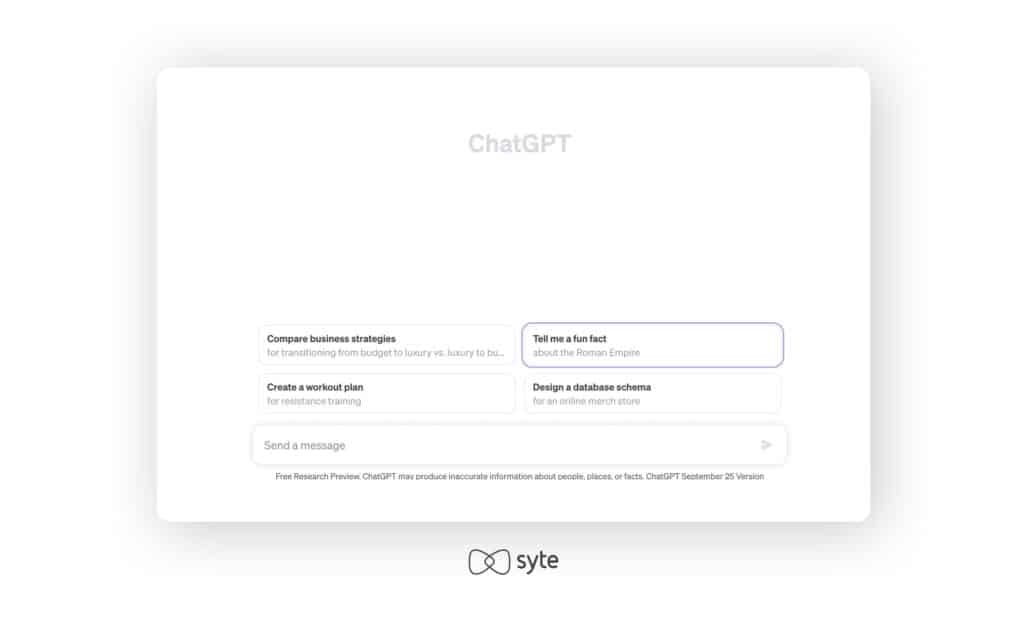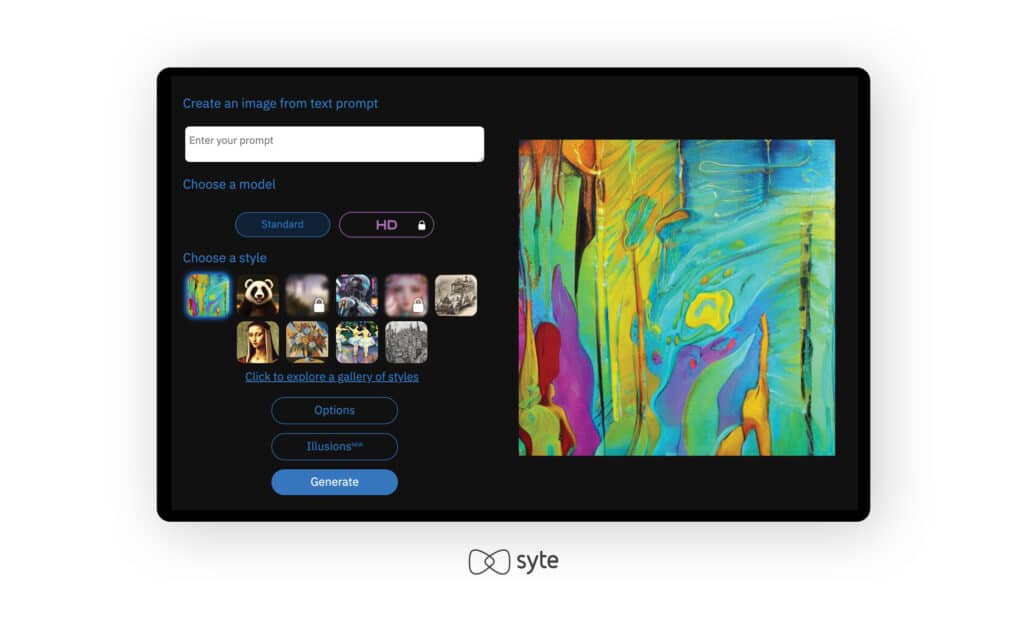When ChatGPT started trending early this year, artificial intelligence (AI) still seemed somewhat out of reach. More sci-fi and less marketable product or solution. But over the last 10+ months, that has dramatically changed.
Today, AI is impossible to ignore. Whether you like it or not, AI is everywhere and has become the defining topic of 2023. ChatGPT, now considered the OG Gen AI, is estimated to receive 1.5B site visits monthly.
And OpenAI (ChatGPT’s parent company) is not alone — nearly every major player in the tech world now offers some sort of AI tool. With the AI world growing by the day, it can be an intimidating and confusing place for anyone, especially those already tasked with growing D2C brands and businesses.
So many people are asking “where do I start”, “how do I catch up”, and “what sources are reliable”, as they try and develop an understanding and use case for AI.
In this post, you’ll learn about some of the most popular types of AI tools. Then, we’ll cover useful and actionable AI-driven marketing strategies you can use right now.
How Are Companies Using AI for D2C Marketing?

Before we get into our list of marketing strategies, it’s good to know how companies in the D2C realm can use AI. While one or maybe a few processes pop into your mind, there is a multitude of uses you can utilize AI for:
- Chatbots: You’ve likely noticed the influx of online chatbots. Almost every brand’s website has a familiar chatbot pop-up for visitors. Chatbots are great starting points for D2C companies getting started with AI because some of the most developed commercial tools are aimed at language.
- Personalization Tools: D2C companies that run eCommerce stores know that personalization is a hot topic, and often the source of big metric gains. Personalization tools learn your customer’s preferences to deliver personalized recommendations, shopping experiences, and can help support some of the AI marketing strategies we’ll highlight later.
- Product Search Experiences: As business owners know, not all customers share the same interests or want the same things. AI-enhanced product search tools can help expedite your customer’s shopping journey, and help them fine tune their product selection. Amazon has publicly talked about how it anticipates its work in AI to redefine its search experience.
- Content Generation: According to a 2023 report from Semrush, 97% of surveyed companies reported positive results from content marketing. And with so many AI solutions focusing on SEO, PPC, and social media friendly content creation, it’s no wonder that tools here are some of the biggest early winners in the AI boom. If your business has subject matter experts (SMEs) to guide them, AI content generation tools can be a huge time-saver. One important note: Because so many marketers are carelessly abusing AI content generation, you’ll have an opportunity to stand out by ensuring your content is created by humans, for humans.
- Competition Research: It’s rare to find a business without competitors. But not every company has the time or resources to keep an eye on all the competition everywhere. Finding the right AI competition research tool can give you untapped insights into their marketing strategies, from keywords to tone of voice to influencer engagement.
- Code Creation and Analysis: Certain business initiatives require multiple teams to merge. When marketing and programming come together, AI code creation and analysis tools can be major time-savers for busy businesses. “Copilot” tools are helping to defray the time needed to complete some of the most expensive projects for D2C brands.
6 Ideal AI Marketing Strategies for D2C Brands
Probably the biggest question we are being asked is how to use AI effectively in marketing strategies for D2C brands. Where is real value happening? Here are some of the key tips to building a strategy that effectively uses AI.
1. Start Small
The AI world is ever-evolving. Because of that, many business owners are either shying away from AI or getting a little too invested in it.
If you’re unsure how to implement an AI marketing strategy for your business, the endless new AI-related companies, tools, and services can overwhelm anyone. Don’t worry about changing every aspect of your company’s D2C marketing to include AI. There’s no need to waste your and your employees’ valuable time digging into every current AI tool or service.
There’s an easier and smarter way to dip your toes into the AI pool. That’s by starting small and implementing or utilizing AI in a few areas to see what works and what does not.
One of the best received tips we’ve offered is to begin your AI journey by narrowing in on just two to three popular AI tools and developing a meaningful skillset around how to use them in your workflows.
That leads to point two…
2. Find What Solves Your Problems First

As our last point mentioned, starting your AI marketing strategy with just a few tools is best.
One of the best ways to blend AI upskilling with your current D2C marketing activities is to look for those that overlap significantly (or outright replace) some of the work you’re doing manually.
If you have highly repetitive tasks that are important for successful execution of your holiday eCommerce marketing strategies, start there.
Coalition is using AI to enhance product imagery used in ads, test various headlines and captions, generate videos, create copy, analyze Google Analytics and Shopify store data, and more.
Previously, these types of activities would have taken hours for an individual — now, we can reduce that time by 70% to 80%, while seeing improved outcomes.
We’ve encouraged our brands to inventory repetitive and high value tasks across their organizations, then have worked with them to build, integrate, or select AI tools to incorporate in their workflow.
3. Look at Current Tools Implementing AI
When considering AI marketing strategies, you may imagine the pain of learning new products and services from the ground up. Fortunately, that’s not the case! In fact, you and your employees may be more comfortable with AI than you think.
Essential business products, including Google Sheets and Excel, currently use AI features to make their offerings as efficient and effective as possible. Speaking of Google, this company also uses AI in its Google Docs tool for users.
A lot of eCommerce platforms and marketing tools are making incremental AI additions or improvements, so if you’re already using a software, look for what AI additions may have already been added. Chances are, there will be a few to try out.
4. Create Great Prompts
Great AI tools depend on great data. And great data only produces outputs as good as the “prompts” you put in. Simply put, a prompt is a command for AI programs to follow. Because of that, every great AI marketing strategy begins with excellent prompts.
Think of many AI tools as a search engine. You must type in words to give a search engine something to find. Likewise, most AI tools require question-based or command-based prompts from users.
We recommend being as specific as possible when giving prompts to AI tools. An AI program needs specialized guidance and feedback. Try creating prompts covering the who, what, why, when, and where of the information you seek. The more specific instructions you give AI interfaces, the better results you typically get.
As with most things in AI, there is now a myriad of resources to identify great prompting strategies, so bookmark a few of your favorites, or join communities where prompt strategies are being shared.
5. Make the Personal Brand Connection
As you begin to create more workflows that use AI for your D2C marketing, don’t lose sight of the “it” factor that makes your brand uniquely valuable to your consumers.
One of the risky byproducts of over dependence on AI is everyone starts to look and sound the same online. By working to more clearly articulate your brand personality and perspectives to and through AI tools, you’ll avoid that watering down.
How do you do that?
Consider using your own content and data (if there’s enough), or the content and data shared with you by consumers, to generate more personalized AI outcomes.
Remember those pesky customer personas that new CMOs demand, evangelize, and forget about every two years? Use AI to develop more realistic and substantial ones, then use it to build a more personalized, brand authentic go-to-market strategy.
6. Don’t Let AI Put Your D2C Marketing on Autopilot

With so many companies touting their AI-powered solutions, it’s understandable to think of these tools as push-button solutions. Unfortunately, that’s a long way from happening.
While we believe we’re not far off from some semblance of artificial general intelligence (AGI), we don’t see humanity losing value any time soon. In fact, you’re likely to see the quirks and foibles of humanity become more emphasized as AI tools trained on mass market data shade everything gray.
Make sure you build checkpoints in for each AI tool you implement — check for accuracy, authenticity, clarity, and even keep an eye out for security issues. Human oversight is still very much needed in the world of AI. The day it’s not, is probably the day when AI has the oversight of humanity. (Cue “Terminator” credits).
For help with D2C marketing, AI, SEO, and more, contact Coalition Technologies today. Our team of industry-leading digital marketing experts will exceed your goals with results-driven marketing.